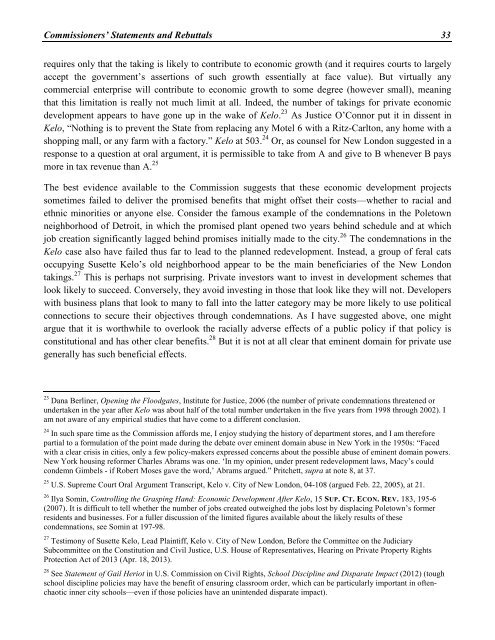You also want an ePaper? Increase the reach of your titles
YUMPU automatically turns print PDFs into web optimized ePapers that Google loves.
Commissioners’ Statements and Rebuttals 33requires only that the taking is likely to contribute to economic growth (and it requires courts to largelyaccept the government’s assertions of such growth essentially at face value). But virtually anycommercial enterprise will contribute to economic growth to some degree (however small), meaningthat this limitation is really not much limit at all. Indeed, the number of takings for private economicdevelopment appears to have gone up in the wake of Kelo. 23 As Justice O’Connor put it in dissent inKelo, “Nothing is to prevent the State from replacing any Motel 6 with a Ritz-Carlton, any home with ashopping mall, or any farm with a factory.” Kelo at 503. 24 Or, as counsel for New London suggested in aresponse to a question at oral argument, it is permissible to take from A and give to B whenever B paysmore in tax revenue than A. 25The best evidence available to the Commission suggests that these economic development projectssometimes failed to deliver the promised benefits that might offset their costs—whether to racial andethnic minorities or anyone else. Consider the famous example of the condemnations in the Poletownneighborhood of Detroit, in which the promised plant opened two years behind schedule and at whichjob creation significantly lagged behind promises initially made to the city. 26 The condemnations in theKelo case also have failed thus far to lead to the planned redevelopment. Instead, a group of feral catsoccupying Susette Kelo’s old neighborhood appear to be the main beneficiaries of the New Londontakings. 27 This is perhaps not surprising. Private investors want to invest in development schemes thatlook likely to succeed. Conversely, they avoid investing in those that look like they will not. Developerswith business plans that look to many to fall into the latter category may be more likely to use politicalconnections to secure their objectives through condemnations. As I have suggested above, one mightargue that it is worthwhile to overlook the racially adverse effects of a public policy if that policy isconstitutional and has other clear benefits. 28 But it is not at all clear that eminent domain for private usegenerally has such beneficial effects.23 Dana Berliner, Opening the Floodgates, Institute for Justice, 2006 (the number of private condemnations threatened orundertaken in the year after Kelo was about half of the total number undertaken in the five years from 1998 through 2002). Iam not aware of any empirical studies that have come to a different conclusion.24 In such spare time as the Commission affords me, I enjoy studying the history of department stores, and I am thereforepartial to a formulation of the point made during the debate over eminent domain abuse in New York in the 1950s: “Facedwith a clear crisis in cities, only a few policy-makers expressed concerns about the possible abuse of eminent domain powers.New York housing reformer Charles Abrams was one. ‘In my opinion, under present redevelopment laws, Macy’s couldcondemn Gimbels - if Robert Moses gave the word,’ Abrams argued.” Pritchett, supra at note 8, at 37.25 U.S. Supreme Court Oral Argument Transcript, Kelo v. City of New London, 04-108 (argued Feb. 22, 2005), at 21.26 Ilya Somin, Controlling the Grasping Hand: Economic Development After Kelo, 15 SUP. CT. ECON. REV. 183, 195-6(2007). It is difficult to tell whether the number of jobs created outweighed the jobs lost by displacing Poletown’s formerresidents and businesses. For a fuller discussion of the limited figures available about the likely results of thesecondemnations, see Somin at 197-98.27 Testimony of Susette Kelo, Lead Plaintiff, Kelo v. City of New London, Before the Committee on the JudiciarySubcommittee on the Constitution and Civil Justice, U.S. House of Representatives, Hearing on Private Property RightsProtection Act of 2013 (Apr. 18, 2013).28 See Statement of Gail Heriot in U.S. Commission on Civil Rights, School Discipline and Disparate Impact (2012) (toughschool discipline policies may have the benefit of ensuring classroom order, which can be particularly important in oftenchaoticinner city schools—even if those policies have an unintended disparate impact).


